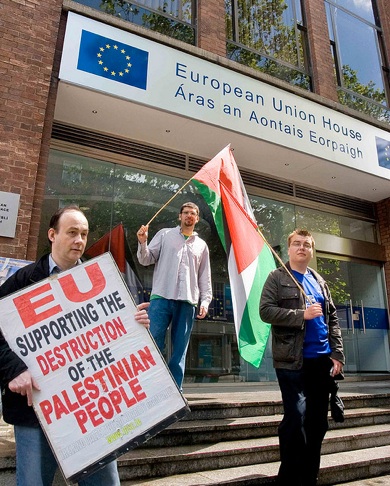Research & Development

There are all sorts of links and agreements with Israel:
The EU Framework Programme for Research and Technical Development
Cf. http://cordis.europa.eu/fp7/dc/index.cfm
Israel is the only non-European country which has (since 1996) been fully associated with the EU’s Research and Technological Framework Programmes. This in effect means that Israeli scientific research and arms companies are eligible for EU funding.
Israel was the first non-European country to be associated to the EU’s Framework Programme for
Research and Technical Development (RTD). On visiting Israel in 2007, the EU Commissioner Janez Potocnik noted that the EU was Israel’s second biggest source of public research funding. ‘Israel is currently participating in over 800 EU RTD Framework Programme projects in fields ranging from cutting edge research through nanotechnology and information and communication technology to energy and health. Surveys show that a large majority of Israeli researchers in both universities and industry describe their participation in the Framework programme as "very important" to their work.’ The EU website comments that Europe ‘appreciates the technological excellence and the entrepreneurial spirit of Israeli enterprises’ while Europe offers ‘a huge market potential in close proximity to Israel’. Click here. Further, in 2004 the European Commission signed an agreement with Israel allowing it to participate in the EU’s Galileo project for a Global Navigation Satellite System. (Formerly on the website ‘Delegation of the European Union to Israel’ but seemingly removed.) The significance of this should not be lost on us.
The European Research Area (ERA)
Israel participates in the European Research Area. The European Parliament initially tried to block ERA membership to Israel. The ERA aims to create a common market for research across Europe, fostering cooperation between research institutions.
Industrial Research and Development Agreement
In June 1999 an Industrial Research and Development Agreement was signed between the UK and Israel. Its purpose is ‘to promote cooperation in industrial research and development between private sector companies in the United Kingdom and Israel by establishing a joint United Kingdom - Israeli industrial research and development fund (the BRITECH Fund) to support collaborative projects between such companies’. The UK agreed to contribute £7.75 million to this fund during the first five years.
In November 2008 the then UK Business Secretary Peter Mandelson called for stronger business ties between the UK and its ‘firm friend’ Israel. The UK aimed, he said, to raise trade between the two countries from £2.3 billion in 2007 to £3 billion by 2012. Mandelson commented that opportunities existed in financial services, bio-technology, ICT, medical equipment and software, and in creative industries including film-making. (‘UK Economic Links with Israeli Settlements’, scroll down to download the full report, p.11 of the report, p. 18 of the pdf.)
BIRAX
Subsequent to it having been developed by the British Council, the Britain-Israel Research and Academic Exchange Partnership (BIRAX) was jointly launched by the then Prime Minister of the UK Gordon Brown and the then Israeli Prime Minister Ehud Olmert during Brown’s visit to Israel in July 2008. According to its website: ‘The aim of the scheme is to strengthen academic cooperation between universities in the UK and Israel through the awarding of grants for joint research in all areas of science.’ . On 17 Jan. 2010 the Labour government announced that it would be upgrading its funding from £20K to £29K for 2010/11, the Foreign Office minister Ivan Lewis commenting: ‘In its first year the scheme went a long way to help build and enhance university links between Britain and Israel... The volume and calibre of applications submitted to the scheme in 2009 demonstrated just how keen British and Israeli academics are to work together and complement each other’s research strengths. Government support for BIRAX is a tangible example of our determination to oppose boycotts against Israel, which are unacceptable and do nothing to promote understanding or the cause of peace in the Middle East.’ (17.01.10, Labour Friends of Israel website.) BIRAX gives grants totalling £365,000. In addition to British and Israeli government support, the bulk of the funding is provided by the Pears Foundation (£550,000 over five years) and the United Jewish Israel Appeal (UJIA) (£200,000 over five years). The programme was designed in close consultation with the Pears Foundation, the Department for Business, Skills and Innovation (BIS), the Foreign and Commonwealth Office (FCO) and Israel’s Ministry of Science and Technology. (Labour Friends of Israel, ‘Key Issues’, 18.01.10).
Foreign Investment in Israel
Since the mid 1990s (the Oslo years) Israel has benefited from rising foreign investment, particularly in telecommunications, electronics, medical equipment, software, internet and semiconductors. In 2005 the total inflow exceeded $5.6 billions, accounting for 26% of Israeli GDP; in 2007 (the latest figures given) €11.3 billion. (European Commission; Trade; Israel.)
See Further on this Site:

Flickr Commons: Michael Stamp, 2009
Members if the Irish Palestinian Solidarity Campaign protest at the EU's closer diplomatic ties with Israel.